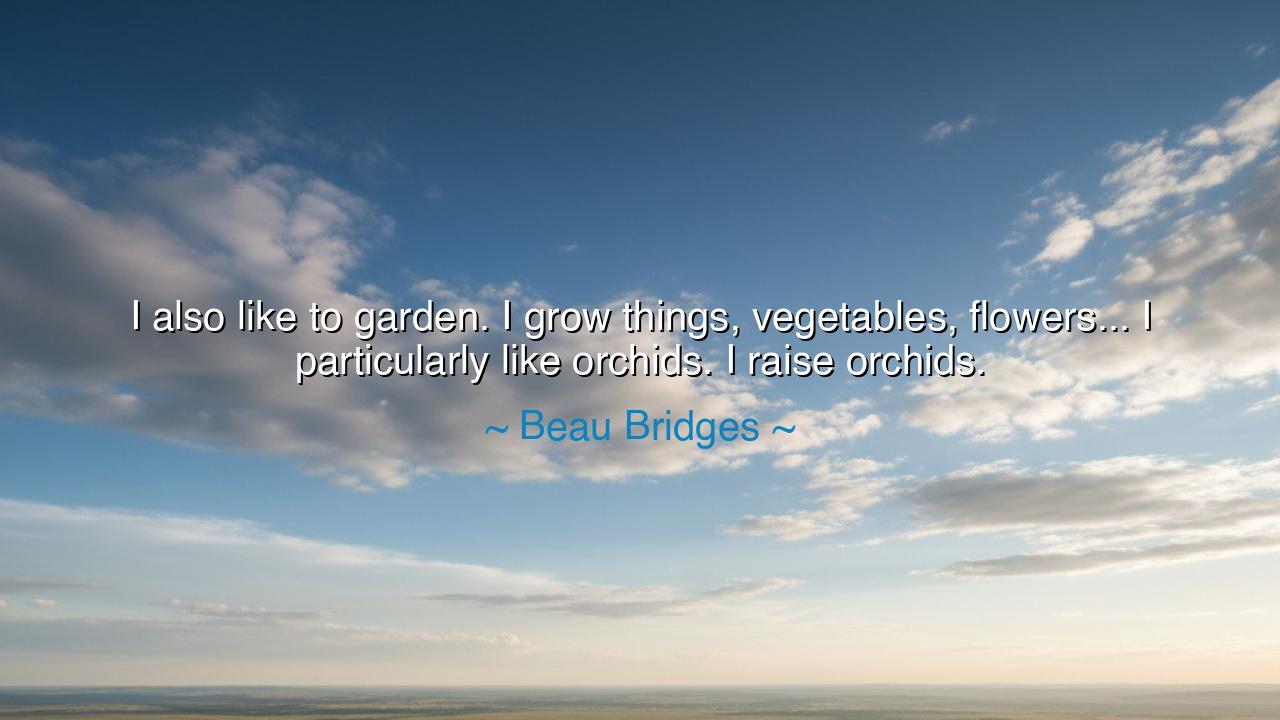
I also like to garden. I grow things, vegetables, flowers... I
I also like to garden. I grow things, vegetables, flowers... I particularly like orchids. I raise orchids.






“I also like to garden. I grow things, vegetables, flowers… I particularly like orchids. I raise orchids.” Thus spoke Beau Bridges, the actor of quiet strength and thoughtful grace, revealing in these words a truth that transcends fame, art, and even time itself. For within this simple confession lies an ancient wisdom — that to garden is to participate in the sacred rhythm of creation, and to raise orchids, those delicate and temperamental blooms, is to learn the virtues of patience, tenderness, and devotion. Though his life has been spent upon stages and before cameras, Bridges reminds us here that the greatest performance is not given before an audience, but before the living earth itself.
The origin of this quote lies in the life of a man who, despite his renown, has remained grounded in the everyday acts that nourish the soul. Beau Bridges, son of the great actor Lloyd Bridges, grew up amidst the glamour of Hollywood — a world of appearances, scripts, and perpetual motion. Yet even amid that glittering artifice, he found solace in the earth — in the quiet, enduring reality of growth. To garden, for him, is to step away from illusion and return to truth. The vegetables and flowers he tends are not props nor performances; they are living things, demanding authenticity. His orchids, in particular, are a reflection of the human spirit — fragile yet resilient, demanding care but offering beauty that cannot be faked. They are, as all true things are, both humble and transcendent.
To say, “I grow things,” is to proclaim an allegiance with creation itself. The act of growing — whether a seed, an idea, or a soul — is the highest calling of mankind. It requires not haste but patience, not dominance but partnership. In the garden, man becomes both servant and steward, discovering that control is an illusion, and that growth belongs to time, to the rain, to the unseen forces that weave life together. In this sense, Beau Bridges’ words echo the wisdom of the ancients. The philosopher Cicero once wrote, “If you have a garden and a library, you have everything you need.” For in the garden, one learns to read the silent book of nature — a book written not in ink, but in dew, sunlight, and soil.
The orchid, that most exquisite of flowers, carries its own parable. Unlike the wild daisy or the sturdy oak, it is delicate, almost otherworldly, requiring constant attention. To raise orchids is not simply to water them, but to understand them — to sense their needs, to respond with care, to give without expectation of immediate reward. Such a practice mirrors the care of the soul, for the human heart, too, is like an orchid: easily wounded, yet capable of breathtaking beauty when loved and nurtured rightly. In tending his orchids, Bridges partakes in the sacred art of cultivation — the same art by which the wise have always tended their inner lives.
Consider the story of Emperor Hadrian, who, though ruler of vast lands, sought peace not in conquest but in cultivation. In the gardens of his villa at Tivoli, he planted groves and ponds, tended trees, and surrounded himself with beauty born of patience. There he learned that ruling the earth begins not with command, but with care. Like Beau Bridges, Hadrian understood that the power to grow something is the purest form of creation — not the creation of spectacle, but of life itself. The emperor and the gardener are kindred spirits: both shape the world quietly, through endurance and reverence.
There is also humility in Bridges’ words — a recognition that all beauty, from the vegetable to the flower, depends upon labor and time. To garden is to accept imperfection, to embrace failure as part of growth. The tomato plant will wilt; the orchid will sometimes refuse to bloom. Yet the gardener persists, not because of success, but because of love. This is a lesson for all who live in a world obsessed with achievement and appearance: the worth of life is not measured in what we produce, but in what we tend with faithfulness. The garden teaches that every act of care — no matter how small — joins us to the eternal cycle of renewal.
Therefore, my child, learn from Beau Bridges’ quiet devotion. In a world that rushes toward glory, take time to plant, to grow, to raise what is living. Find your own “orchid” — that delicate pursuit that requires your patience, your humility, your love. Whether it is a garden, a craft, or a relationship, tend it with care, for it will mirror your own soul. And when the bloom comes — sudden, unexpected, radiant — you will see in it not only beauty, but truth: that all good things arise not from force, but from the slow, steady work of love.
For in the end, as Beau Bridges reminds us, the most enduring art is not the performance upon the stage, but the cultivation of life itself. To garden is to live in harmony with creation. To grow things is to believe in tomorrow. And to raise orchids — fragile, fleeting, but exquisite — is to understand the divine balance between tenderness and strength, patience and passion, labor and grace. Tend your garden, both of earth and spirit, and you will discover what every sage, artist, and gardener has always known: that to care for life is the purest form of wisdom.






AAdministratorAdministrator
Welcome, honored guests. Please leave a comment, we will respond soon